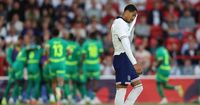England suffered a stunning 3-1 defeat to Senegal on June 10, 2025, at the City Ground, marking their first ever loss to an African nation and delivering a harsh blow to Thomas Tuchel’s early tenure as England manager. The Three Lions started brightly with Harry Kane scoring an early goal, but Senegal’s resilience and tactical prowess saw them overturn the deficit with three goals, leaving English supporters booing their team off the pitch in frustration.
The match began promisingly for England. After only seven minutes, Anthony Gordon’s shot was saved by Senegal’s goalkeeper Edouard Mendy, but Kane was quickest to react and slotted the rebound home from close range, giving England the perfect start. For a brief spell, England looked comfortable, with the likes of Eberechi Eze and Conor Gallagher providing energy in midfield and forward positions. Yet, despite this early advantage, Senegal’s threat was evident as Dean Henderson, England’s goalkeeper, was forced into five crucial saves before half-time, underscoring the visitors’ attacking intent.
Senegal, ranked 19th in the world and boasting a squad full of talented players, gradually grew into the game. Their equaliser came five minutes before the break when Nicolas Jackson cleverly kept the ball in play and delivered a precise cross into the box. England’s veteran right-back Kyle Walker was caught out of position as Ismaila Sarr outpaced him to finish expertly, leveling the scores. Walker’s defensive lapse was a significant moment, highlighting the defensive frailties England displayed throughout the match.
After the interval, Senegal took control. Their second goal came courtesy of Habib Diarra, who capitalized on a long ball over the top. Diarra skillfully drove into the penalty area and slotted the ball through Henderson’s legs from a tight angle, putting Senegal ahead. This goal epitomized England’s defensive disarray and inability to respond effectively to Senegal’s counter-attacks. The goal also intensified pressure on Tuchel, who had already been grappling with criticism following England’s unconvincing 1-0 win over Andorra just days earlier.
Tuchel’s team made several changes in an attempt to salvage the game. Morgan Gibbs-White, a local Nottingham Forest star, was introduced in the second half and showed promise with creative play and relentless effort. He was central to England’s best attacking moments, including a powerful shot that was well saved by Mendy. Despite these efforts, England struggled to break down Senegal’s disciplined defense and failed to regain the lead.
One of the most dramatic moments of the match came late when Jude Bellingham, England’s midfield maestro and supposed golden child, appeared to have scored a crucial equaliser with a close-range volley from a corner. However, after a VAR review, the goal was disallowed due to a handball by Levi Colwill in the build-up. This decision was a bitter pill to swallow for England, extinguishing hopes of a late comeback and leaving Bellingham visibly frustrated. The incident underscored the fine margins and the growing pains of a team struggling to find cohesion under Tuchel’s guidance.
The final nail in the coffin came during stoppage time when Senegal substitute Cheikh Sabaly finished a swift counter-attack, calmly placing the ball beyond Henderson to seal a memorable victory for the visitors. The goal sparked jubilant celebrations from Senegal’s traveling fans and echoed around the City Ground as boos rained down on the home side.
For England, the defeat exposed several worrying issues. Defensively, the team was porous and disorganized, with Walker’s error and the failure to handle counter-attacks proving costly. Midfield control was absent, continuing a trend dating back to the final days of the Gareth Southgate era, where England have struggled to dictate the tempo of matches. Offensively, reliance on Harry Kane was starkly evident. Ivan Toney, despite being included in the squad, was given only three minutes of playtime, even after Kane was substituted. Instead, Tuchel opted to field Morgan Rogers and Eberechi Eze upfront, a decision that highlighted the lack of clear attacking alternatives.
Anthony Gordon endured a frustrating night as well. The Newcastle winger, who has impressed at club level, failed to make an impact internationally, missing a golden opportunity at the back post and being substituted before the hour mark. His ineffective performance mirrored the overall lacklustre display from the English attack, which struggled to create clear-cut chances against a well-organized Senegal side.
Tuchel, who had hoped to build momentum after the narrow win over Andorra, now faces a daunting challenge. The German manager openly expressed concerns about his team’s attitude and fading energy towards the end of halves, issues that were glaringly apparent against Senegal. The pressure is mounting as England’s potential as World Cup contenders a year from now looks increasingly uncertain. The team’s inability to produce consistent performances and adapt tactically raises serious questions about their readiness for the rigours of the upcoming tournament in the United States.
On the bright side, Harry Kane’s status as England’s talisman remains unchallenged. Scoring in both recent fixtures, he continues to be the focal point of England’s attack. Meanwhile, Morgan Gibbs-White’s introduction showcased his potential to influence games, providing a glimpse of hope for England’s attacking options beyond Kane.
Despite the defeat, Senegal’s performance was a testament to their quality and tactical acumen. Their ability to control key moments, exploit defensive lapses, and execute swift counter-attacks made them deserving winners. The victory also carried historical significance, marking England’s first ever loss to an African nation, a milestone that resonated deeply within the football community and among Senegalese journalists celebrating the triumph.
As the international break continues, England must regroup and address their glaring weaknesses. The upcoming months will be crucial for Tuchel to instill confidence, tactical discipline, and resilience within his squad. With the World Cup looming, the Three Lions have little room for error if they are to fulfill the lofty expectations placed upon them.
For now, the echoes of boos at the City Ground serve as a stark reminder of the challenges ahead. England’s journey towards World Cup glory is far from assured, and the road to redemption will require more than just moments of brilliance—it demands a collective, consistent performance that has so far eluded Tuchel’s side.




